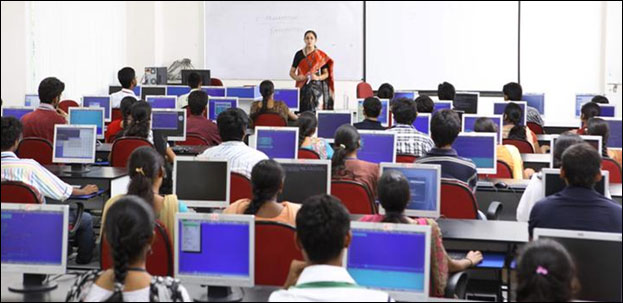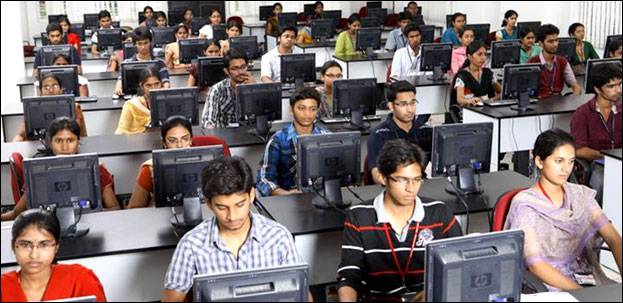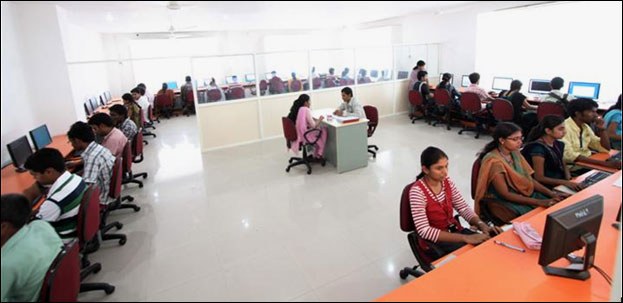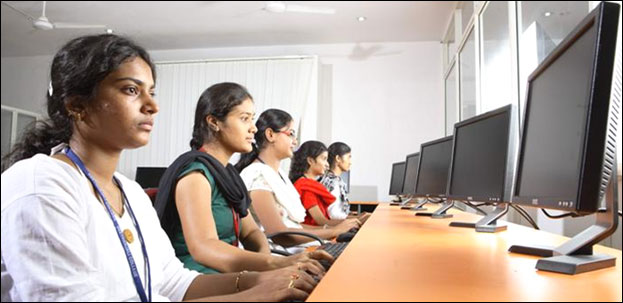CSE - Emerging Areas
B.Tech (Computer Science and Engineering) Emerging Areas are established with four programs, namely, - B.Tech. "Computer Science and Engineering - Artificial Intelligence and Machine Learning" (CSE-AI&ML), B.Tech. "Computer Science and Engineering - Data Science" (CSE-DS), B.Tech. "Computer Science and Engineering - Cyber Security" (CSE-CS) and B.Tech. "Computer Science and Engineering - Internet of Things" (CSE-IoT), each with an intake of 60 in the academic year 2020-21. Subsequently, intake in B.Tech. (CSE-AI&ML) are increased to 180 in the academic year 2021-22, 240 in the academic year 2023-24, intake in B.Tech. (CSE-CS) are increased to 180 in the academic year 2023-24, intake in B.Tech. (CSE-DS) are increased to 180 in the academic year 2023-24.
The Department is chaired by Dr. L. Venkateswarlu, he has a total experience of 26 years in Teaching and Research, an accomplished teacher and researcher demonstrating consistent success. He is also an able administrator and communicates effectively. He has good organizational and negotiation skills. Establishes reachable goals, meticulously plans to ensure participation by all and reaches consensus to attain desirable dreams.
Department has 3 Professors, 18 Associate Professors, and 45 Assistant Professors. Among these, 10 doctorates in the department. The department has a supporting staff to assist and maintain the computer laboratories.
There are 2 Professors, 2 Associate Professors, and 11 Assistant Professors and 15 doctorates in the department. The department has a Programmer and 5 System Administrators to assist and maintain the computer laboratories. All the faculty members are encouraged to participate in Faculty Development Programmes, Conferences, Workshops, Publication of Research Papers and active involvement in R & D activity.
Vision and Mission
Vision of the Department
To produce globally competent and socially responsible computer science engineers contributing to the advancement of engineering and technology which involves creativity and innovation by providing excellent learning environment with world class facilities.
Mission of the Department
- To be a centre of excellence in instruction, innovation in research and scholarship, and service to the stake holders, the profession, and the public.
- To prepare graduates to enter a rapidly changing field as a competent computer science engineer.
- To prepare graduate capable in all phases of software development, possess a firm understanding of hardware technologies, have the strong mathematical background necessary for scientific computing, and be sufficiently well versed in general theory to allow growth within the discipline as it advances.
- To prepare graduates to assume leadership roles by possessing good communication skills, the ability to work effectively as team members, and an appreciation for their social and ethical responsibility in a global setting
PEOs, POs and PSOs
PROGRAM EDUCATIONAL OBJECTIVES:
- To provide graduates with a good foundation in mathematics, sciences and engineering fundamentals required to solve engineering problems that will facilitate them to find employment in industry and / or to pursue postgraduate studies with an appreciation for lifelong learning.
- To provide graduates with analytical and problem solving skills to design algorithms, other hardware / software systems, and inculcate professional ethics, inter-personal skills to work in a multi-cultural team.
- To facilitate graduates get familiarized with state of the art software / hardware tools, imbibing creativity and Innovation that would enable them to develop cutting-edge technologies of multi-disciplinary nature for societal development.
PROGRAMME OUTCOMES:
The Program outcomes of B.Tech (CSE) department are being modified with reference to Graduate Attributes given by NBA in June 2015 are as below
- Engineering knowledge: Apply the knowledge of mathematics, science, engineering fundamentals, and an engineering specialization to the solution of complex engineering problems.
- Problem analysis: Identify, formulate, review research literature, and analyze complex engineering problems reaching substantiated conclusions using first principles of mathematics, natural sciences, and engineering sciences.
- Design/development of solutions : Design solutions for complex engineering problems and design system components or processes that meet the specified needs with appropriate consideration for the public health and safety, and the cultural, societal, and environmental considerations.
- Conduct investigations of complex problems: Use research-based knowledge and research methods including design of experiments, analysis and interpretation of data, and synthesis of the information to provide valid conclusions.
- Modern tool usage: Create, select, and apply appropriate techniques, resources, and modern engineering and IT tools including prediction and modelling to complex engineering activities with an understanding of the limitations.
- The engineer and society: Apply reasoning informed by the contextual knowledge to assess societal, health, safety, legal and cultural issues and the consequent responsibilities relevant to the professional engineering practice.
- Environment and sustainability: Understand the impact of the professional engineering solutions in societal and environmental contexts, and demonstrate the knowledge of, and need for sustainable development.
- Ethics: Apply ethical principles and commit to professional ethics and responsibilities and norms of the engineering practice.
- Individual and team work: Function effectively as an individual, and as a member or leader in diverse teams, and in multidisciplinary settings.
- Communication: Communicate effectively on complex engineering activities with the engineering community and with society at large, such as, being able to comprehend and write effective reports and design documentation, make effective presentations, and give and receive clear instructions.
- Project management and finance: Demonstrate knowledge and understanding of the engineering and management principles and apply these to one’s own work, as a member and leader in a team, to manage projects and in multidisciplinary environments.
- Life-long learning : Recognize the need for, and have the preparation and ability to engage in independent and life-long learning in the broadest context of technological change.
B.Tech-CSE(AIML)
PROGRAM SPECIFIC OUTCOMES:
PSO1: Demonstrate competency in Programming and problem solving skills and apply those skills in solving computing problems
PSO2: Select appropriate programming languages, Data structures and algorithms in combination with modern technologies and apply them in developing innovative solutions
PSO3: Demonstrate adequate knowledge in the concepts and techniques of artificial intelligence and machine learning, apply them in developing intelligent systems to solve real world problems
B.Tech-CSE(DS)
PROGRAM SPECIFIC OUTCOMES:
PSO1: Demonstrate competency in Programming and problem solving skills and apply those skills in solving computing problems
PSO2: Select appropriate programming languages, Data structures and algorithms in combination with modern technologies and apply them in developing innovative solutions
PSO3: Apply techniques of data modeling, analysis and visualization which include statistical techniques to solve real world problems delivering actionable insights for decision making.
B.Tech-CSE(CS)
PROGRAM SPECIFIC OUTCOMES:
PSO1: Demonstrate competency in Programming and problem solving skills and apply those skills in solving computing problems
PSO2: Select appropriate programming languages, Data structures and algorithms in combination with modern technologies and apply them in developing innovative solutions
PSO3: Apply cryptographic algorithms for ensuring cyber security as per cyber laws, demonstrate awareness of all the security related issues and employ state of the art technologies to protect the digital assets of an organization
B.Tech-CSE(IOT)
PROGRAM SPECIFIC OUTCOMES:
PSO1: Demonstrate competency in Programming and problem solving skills and apply those skills in solving computing problems
PSO2: Select appropriate programming languages, Data structures and algorithms in combination with modern technologies and apply them in developing innovative solutions
PSO3: Demonstrate an ability in using IoT devices and protocols to develop IoT based solutions for real world problems
Syllabus
Syllabus
- Revised AR22 & AR20 Regulations
- B.Tech CSE(AIML) AR22 Syllabus (2023-24)
- B.Tech CSE(DS) AR22 Syllabus (2023-24)
- B.Tech CSE(CS) AR22 Syllabus (2023-24)
- Modified Regulations of B.Tech AR22
- B.Tech CSE(AIML) AR22 Syllabus (2022-23)
- B.Tech CSE(DS) AR22 Syllabus (2022-23)
- B.Tech CSE(CS) AR22 Syllabus (2022-23)
- B.Tech CSE(IOT) AR22 Syllabus (2022-23)
- B.Tech CSE(AIML) AR20 Syllabus, 2021-22 Admitted Students
- B.Tech CSE(DS) AR20 Syllabus, 2021-22 Admitted Students
- B.Tech CSE(CS) AR20 Syllabus, 2021-22 Admitted Students
- B.Tech CSE(IOT) AR20 Syllabus, 2021-22 Admitted Students
- B.Tech CSE(AIML) AR20 Syllabus
- B.Tech CSE(DS) AR20 Syllabus
- B.Tech CSE(CS) AR20 Syllabus
- B.Tech CSE(IOT) AR20 Syllabus
Faculty List
Click on Name for Profile
| Name | Designation | Qualification | Faculty Registration ID |
|---|---|---|---|
| Dept :B.Tech. Computer Science and Engineering (AI & ML)-UG | |||
| Dr. V. Madhusudan Rao | Professor & Dean-School of Computer Science and Informatics | BE (CE), M.Tech. (C.S) and M.S (SE), Ph.D | 7900-200703-114413 |
| Dr. L.Venkateswarlu | Professor & HoD (AIML) | B.Sc, MCA, M.Tech., Ph.D | 1793-150407-210245 |
| Dr. G. Bindu Madhavi | Associate Professor & Associate Dean, Cyber Security Cell | B.Sc, M.Tech MCA, Ph.D | 78150406-160752 |
| Dr. K. Arpitha | Associate Professor | BSc, MCA, M.Tech, Ph.D | 3762-230831-140634 |
| G Vedavyas | Associate Professor | BE (Chemical), M.Tech. (CS &Tec.) | 0492-150409-114339 |
| Shaik Akbar | Associate Professor | BE, M.Tech. | 2878-170201-115525 |
| B Sudhakar | Associate Professor | BE, M.Tech. | 31150404-131148 |
| K Siva Rama Krishna | Associate Professor | BSc, M.Tech., M.Sc | 05150403-111448 |
| Dr. B. Adithya | Assistant Professor | B.Tech, M.Tech., Ph.D | 6891-220920-142557 |
| K. Naresh Babu | Assistant Professor | B.Tech. (IT), M.Tech. (CS), (Ph.D) | 1179-150409-143256 |
| Preeti Prasada | Assistant Professor | B.Tech. (IT), M.Tech. (Comp. Eng.), (Ph.D) | 5393-150409-112851 |
| M. Siva Prasad | Assistant Professor | B.Tech., M.Tech. | 42150407-063735 |
| E. Swapna | Assistant Professor | M.Tech. (CSE) | 6508-210201-130534 |
| K. Padmaja | Assistant Professor | B.Sc, M.Tech MCA | 7742-150417-153242 |
| P Aparna | Assistant Professor | B.Sc, M.Tech. CSE) MCA | 5585-150417-144825 |
| D Aparna | Assistant Professor | B.Tech., M.Tech. (CSE) | 3583-210714-122826 |
| G. Ashok | Assistant Professor | B.Tech. (IT), M.Tech (SE) | 2346-150408-131947 |
| S. Ramana Reddy | Assistant Professor | B.Com, M.Tech MCA | 53150404-111012 |
| T Santhosha | Assistant Professor | B.Tech., M.Tech | 9984-150420-115607 |
| Ch. Nageswara Rao | Assistant Professor | B.Tech., M.Tech | 8462-160121-145420 |
| H V Ramana Rao | Assistant Professor | B.Tech., M.Tech | 95150407-113911 |
| E. Pravalika | Assistant Professor | B.Tech., M.Tech | 3768-221121-095821 |
| N. Poornachandra Rao | Assistant Professor | B.Tech., M.Tech | 4338-170522-164617 |
| M. Supriya | Assistant Professor | B.Tech., M.Tech | 7213-150413-173324 |
| T. Kranthika | Assistant Professor | B.Tech., M.Tech | 7037-230822-102435 |
| P.Swathi | Assistant Professor | B.Tech., M.Tech | 5166-150411-094728 |
| Non-Teaching | |||
| P. Aruna Jyothi | Programmer | B.Tech. | |
| Name | Designation | Qualification | Faculty Registration ID |
|---|---|---|---|
| Dept :B.Tech. Computer Science and Engineering (Data Science)-UG | |||
| Dr. L. Kiran Kumar Reddy | HOD (DS) & Associate Professor | B.E, M.Tech, Ph.D | 4612-151217-230709 |
| Dr. K. Neeraja | Professor | B.Sc, MCA, M.Tech., Ph.D | 62150406-101224 |
| Dr. K. Ambedkar | Associate Professor | B.Sc, M.Tech.(IT), Ph.D | 3420-191107-161934 |
| Dr. A. Venkata Ramana | Associate Professor | B.Sc,M.Sc, M.Tech., Ph.D | 4147-150415-121607 |
| T. Pandu Ranga | Associate Professor | AME, M.Tech. (CSE)- | 0395-171227-101529 |
| S. Tirupathi Rao | Associate Professor | B.E (CE), M.Tech. (CSE) | 42150406-160745 |
| M. V. Lavanya | Assistant Professor | M.Tech. (SE) - | 3512-210312-155957 |
| P. Sangeetha | Assistant Professor | B.Tech. , M.Tech. (CSE) | 6732-161222-141635 |
| G. Vijay Kumar | Assistant Professor | B.Tech., M.Tech (CSE) | 20150404-141037 |
| N. Madhavi | Assistant Professor | B.Tech., M.Tech | 1642-220530-130955 |
| G. Rajasri | Assistant Professor | B.Sc., M.Tech, MCA | 8982-211206-130127 |
| B. Venkateswarlu | Assistant Professor | B.Tech., M.Tech. | 66150402-171228 |
| K Srilatha | Assistant Professor | B.Tech., M.Tech. | 7269-150411-111837 |
| K Laxmi | Assistant Professor | B.Tech., M.Tech. | 9674-160222-100939 |
| M. Anusha Sri | Assistant Professor | B.Tech., M.Tech. | 9674-160222-100939 |
| A Bixapathi | Assistant Professor | B.Tech. (IT), M.Tech. (SE) | 41150407-152301 |
| P. Shambhavi | Assistant Professor | B.Tech., M.Tech. | 7634-220506-111553 |
| Name | Designation | Qualification | Faculty Registration ID |
|---|---|---|---|
| Dept :B.Tech. Computer Science and Engineering (Cyber Security)-UG | |||
| Dr. G. Kalyani | HoD (CS) & Associate Professor | B.Tech., M.Tech., Ph.D | 33150406-151737 |
| Dr. G. Lokeshwari | Associate Professor | B.E (CS), M.Tech. (CS), MBA, Ph.D | 72150331-132356 |
| Shraban Kumar Apet | Associate Professor | B.Tech., M.Tech. | 64150407-120308 |
| M. Sreenu | Associate Professor | B.Tech., M.Tech. | 6636-150501-110906 |
| K. Adi Reddy | Assistant Professor | M.Tech. (SE) | 8993-160109-151017 |
| K Bala Tripura Sundari | Assistant Professor | MCA, M.Tech. | 9210-160213-101450 |
| Shakira | Assistant Professor | B.Tech. , M.Tech. (CSE) | 0611-210707-132733 |
| D. Deepthi Sri | Assistant Professor | B.Tech., M.Tech. (CS- BioIn) | 9307-150410-130851 |
| G. Hima Bindu | Assistant Professor | B.Tech. (IT), M.Tech. (CSE) | 1848-150421-091945 |
| V. Soujenya | Assistant Professor | B.Tech., M.Tech. | 7409-150425-181940 |
| V. Indrani | Assistant Professor | B.Tech., M.Tech. | 23150331-102456 |
| B Ratnamala | Assistant Professor | B.Tech., M.Tech. | 2408-220628-143712 |
| Name | Designation | Qualification | Faculty Registration ID |
|---|---|---|---|
| Dept :B.Tech. Computer Science and Engineering (IOT)-UG | |||
| P. Ramya Krishna | Assistant Professor | B.Tech. (CSE), M.Tech. (SE) | 1576-150409-194504 |
| O Lavanya | Assistant Professor | B.Tech. , M.Tech. (CSE) | 9056-210707-143302 |
| D. Sudheer Reddy | Assistant Professor | B.Tech. (IT), M.Tech. (CSE) | 4010-150409-153341 |
| P. Rahul Das | Assistant Professor | B.Tech., M.Tech. (CSE) | 8794-210709-145612 |
| M Alphonsa | Assistant Professor | B.Tech., M.Tech. (CSE) | 4857-150410-114207 |
| G Mounika | Assistant Professor | B.Tech., M.Tech. (CSE) | 6187-170109-143744 |
| M. Keerthi | Assistant Professor | B.Tech., M.Tech. | 84150407-162843 |
| S. No. | Name of the Staff Member | Qualification | Designation |
|---|---|---|---|
| Non-Teaching | |||
| 1 | K.Shravan Kumar | BSc | System Administrator |
| 2 | A. Nagadharmaveer | MCA | System Administrator |
| 3 | P. Suresh | BSc | System Administrator |
| 4 | P. Kamalakar Reddy | MCA | System Administrator |
| 5 | S. Kiran | BSc | System Administrator |
Laboratory Details
The department has the following laboratories to meet the requirements of CSE and other branches like IT,ECE, EEE. All the laboratories in the department are well equipped with the latest software's and technologies so as to provide required infrastructures to carry in-house projects for final year students as well as R&D activities.
Curriculum Laboratories
- Advanced Data Structures Lab
- IT Workshop(Including Sci Lab)
- Object Oriented Programming Through Java Lab
- Design and Analysis of Algorithms Lab
- Computer Organization and Assembly Language Programming Lab
- Database Management Systems Lab
- Operating Systems Lab
- Computer Networks Lab
- Artificial Intelligence Lab
- Web Technologies Lab
- Software Engineering Lab
- Advanced English Communication Skills Lab
- Mobile Application Development and Compiler Design Lab
- Computer Networks and Cloud Computing Lab
- Machine Learning Lab
- Cryptography and Network Security Lab
- Internet of Things Lab
- Advanced Algorithms Lab
- Digital Forensics Lab
- Data Analytics Lab
- Parallel Computing Lab

Object Oriented Programming & Data Base Management Systems Lab

Operating Systems & Web Technologies Lab

Computer Programming Lab & Computer Networks and Cloud Computing Lab

Advanced Data Structures & Mobile Application Development and Compiler Design Lab
Course Files and Lab Manuals
Course Files
Compiling course files is a concept which had been there for many years in professional college. Geethanjali takes the concept of course file to a new level altogether.
Efforts have been made to prepare course files on every subject taught in all branches altogether. This huge stack of information is specially prepared by the respective faculty members with examinations in mind. A wide variety of questions are compiled catering to the comprehension of the weakest student to challenge the mind of the brightest student.
Not only are the efforts of Geethanjali towards compiling the best material but efforts of the same level are put into ensuring that the students access the information. Group ids are created for each class and the class representative receives this information which he/she passes it on to his/her classmates. All of them can access the information with the help of their username & password generated individually per student.
Along with important questions and answers generated unit wise there are nearly 50 multiple choice questions per unit which will aid the student in their online internal examinations. Not just this academic matter but our faculty also includes website addresses resourceful for their subjects, references and all possible lab viva questions.
The course files are updated every year and versions of it are released.
The course files are updated every year and versions of it are released.
Lab Manuals
The laboratory manuals for each lab are generated with utmost care because at Geethanjali we understand the importance of applied knowledge. We realize that labs are real nests for acquiring knowledge and hence stringent measures are followed while designing them and scrutinized by the HODs before they reach the student. Along with the prescribed number of experiments, more number of experiments are added after consulting the industry requirements. The lab manuals help the student prepare their record and also come prepared for their lab sessions.
MOUs
| S.No | Organization Name | Title | Established Date |
|---|---|---|---|
| 1 | Virtusa Consulting Services Pvt.Ltd | Virtusa Artificial Intelligence Management Services | 01-10-2021 |
| 2 | SmartBridge Educational Services Pvt. Ltd. | Robotics Learning and Development Centre | 02-12-2019 |
| 3 | Redpine Signals | IoT Centre of Excellence | 04-03-2017 |
| 4 | IBM India Pvt.Ltd | IBM Software Lab for Emerging Technologies | 18-08-2017 |
| 5 | Oracle Academy | Oracle Academy Training and Certification Program | 15-07-2015 |
Employability Skills Imparted
- Programming Skills classes are being conducted for all the 3rd year students in addition to their course work.
- Class room training for analytical, aptitude and reasoning skills for students by external experts.
- NPTEL classes conducted as part of the curriculum
The National Programme on Technology Enhanced Learning (NPTEL) is a Government of India sponsored collaborative educational programme. By developing curriculum-based video and web enabled courses the programme aims to enhance the quality of engineering education in India. It is being jointly carried out by 7 IITs and IISc Bangalore, and is funded by the Ministry of Human Resources Development, Government of India.
The video courses in the programme comprises of approximately 40 one-hour lectures for each course and the web supplements contain sufficient information and knowledge that a teacher normally covers in approximately 40 lecture-hours. The contents are based on the model curriculum suggested by All India Council for Technical Education (AICTE) and the syllabi of major affiliating Universities such as Jawaharlal Nehru Technological University, Hyderabad (Andhra Pradesh), Anna University (Tamil Nadu) and Visvesvaraya Technological University (Karnataka)
The main objective of NPTEL program is to facilitate students with supplemental information, more so in this era of non availability of quality teachers for some of the subjects there by providing them with good quality engineering education.
- Innovative and Creative projects are being designed and developed by the students in inter-disciplinary teams.
- Centre for Advancement of Career and Human Excellence (CACHE) is the department of the college responsible for Career Guidance, Training, Placement and Entrepreneurship development. It is a unique initiative of Geethanjali. Its features are
- Was started in 2005
- Deals with Career Guidance, Training, Placements and Entrepreneurship
- With the intention of enhancing the students understanding of employability.
- Training imparted to students from their freshman year.
- Trained to be an asset to their employers.
- Various innovative methods of teaching are implemented
- A special syllabus is planned keeping in view the industry requirements and constraints of regular syllabus.
- Focus is on Communication Skills, Aptitude, and Soft Skills, developing the Confidence of Students, improving their Body Language, inculcating Creativity and into making them responsible individuals.
- A special collection of books is maintained at CACHE to draw students to books and the healthy habit of reading.
- Forging fruitful and mutually beneficial linkages with industries and professional organizations.
- Getting live projects as well as providing placement assistance to its students.
- By organizing key guest lectures and seminars.
- The College gives utmost importance to improving the quality of the graduate student as this is an important aspect of the mission of the college. To that end, we spend considerable amount of time talking with students about their career and professional goals, concerns, and suggestions for improving their learning experience. Since its inception, the college has been continuously striving its best in working towards enhancing the professional culture to serve the needs of an ever-changing and dynamic learning community in an exemplary manner. The college has a Training & Placement cell (T&P cell) which guides the students on all aspects of career planning, job searching, and post-graduate studies. The objective of the cell, inter alia, are:
- To offer career guidance programs and to provide assistance and resources to support students in making real life connections to academic learning.
- To enable students to gain the skills, ability and confidence to transit successfully to further studies/work/self-employment or any other activity in which he/she lands deliberately or unwittingly.
- To provide services which expose students to infinite possibilities available in their future; to equip them with the tools they need to plan for future endeavors and to provide continued support and encouragement that they need to be successful in career as well as life.
- To enable students to evaluate various career options and embark on their career path to meet their interests by showing them how to assess their interests and talents.
- To help find answers to the following questions which pester students:
- What am I going to do when I leave college?
- Do I meet the entrance requirements of places of higher education?
- Can I afford to study further?
- Will I find a job in my chosen field and place?
- Should I take a gap/break after college?
- Are some places better to study than others?
- Is my degree internationally recognized?
- Will my job earn me the money to live the lifestyle I desire?
Finding answers to these questions is easy if one has a good understanding of himself/herself and his/her choice of careers. It is possible to find a career path for each individual which draws on their strengths and builds on areas requiring improvement.

